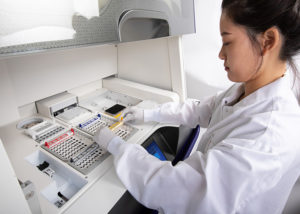
Thermo Ion Torrent Genexus Sequencer instrument. On location.
Q2 Solutions, a clinical trial laboratory services organization resulting from an IQVIA and Quest Diagnostics joint venture, announced its partnership with Thermo Fisher Scientific to use the Ion Torrent Genexus System, the first fully integrated, next-generation sequencing (NGS) platform, to deliver clinical trial lab results economically with unprecedented speed.
“Clinical trial oncology patients require lab testing before they can receive potential life-saving treatments, which makes lab testing turnaround time critical,” said Brian O’Dwyer, chief executive officer at Q2 Solutions. “Our efforts in developing assays and tests to identify and target different aspects of diseases are critical to drug discovery for pharma clients. Adding the capabilities of the Ion Torrent Genexus System has the potential to drastically reduce our time to deliver clinical reports to trial sites, thereby enabling patients’ access to investigational drugs faster.”
The Ion Torrent Genexus System improves turnaround time and minimizes human error for genome profiling, resulting in better delivery of services and further differentiating the Q2 Solutions service offering. With 70% of oncology drugs in development relying on genome profiling to uncover specific disease-causing mutations, this significant advancement in genomic technologies may help get the right therapy to the patient quickly.
“Access to the latest technology to help meet the stringent demands from pharmaceutical clients has become essential in the age of genomic-driven medicine,” said Peter Silvester, senior vice president and president of Life Sciences Solutions at Thermo Fisher Scientific. “We are proud of this strategic relationship with Q2 Solutions and the opportunity it provides for Thermo Fisher to help move healthcare forward.”
Genomic profiling is a laboratory method that is used to learn about the genes in a person or in a specific cell type and the way those genes interact with each other and with the environment. Genomic profiling is done in a privacy-protective manner and may be used to discover why some patients are diagnosed with certain diseases while others are not, or why patients react in different ways to the same drug. It may also be used to help develop new ways to diagnose, treat and prevent diseases, such as cancer.
For more information, visit q2labsolutions.com





Tell Us What You Think!